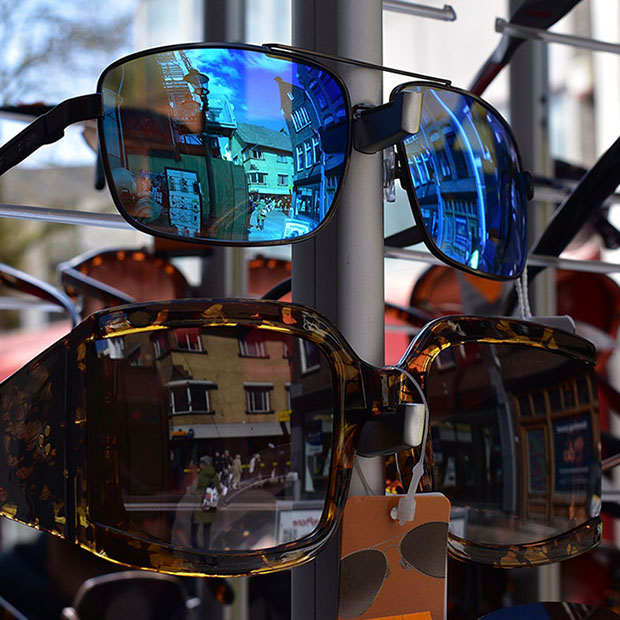Summer is almost here, and that means longer days with more sunlight!
We tend to spend more time outdoors in the warm summer months, which exposes our eyes to more sunlight and the harmful UV rays that come with it. Sunglasses that block UV rays are great for protecting our eyes in all seasons, but especially in the summer.
What Do UV Rays Do to Our Eyes?
Sunlight can affect our eyes even when we aren’t staring directly into it. It’s actually possible to get sunburns on the surface of our eyes, just like we can get sunburned on our skin. It’s called photokeratitis, and the symptoms include redness, tearing, blurred vision, light sensitivity, and a gritty sensation when blinking. It’s also a problem for skiers and snowboarders due to the light reflecting off the slopes (which is why it’s called “snow blindness”). Bright, sandy beaches create a similar effect.
UV Damage Builds Over a Lifetime
UV exposure has a cumulative effect on us. If our eyes get a lot of exposure over the years, it increases the risk of sight-threatening conditions like macular degeneration and cataracts. It also makes us more susceptible to developing conditions like pterygium (also called surfer’s eye), an overgrowth of the clear tissue of the whites of the eyes towards the iris, and pinguecula, which are yellow or white bumps that form in the whites of the eyes.
The Protection of Sunglasses
The main goal when selecting sunglasses has to be UV protection. Set fashion goals aside at first. Check the label to make sure it says something like “blocks at least 99% of UVA and UVB rays.” Bigger lenses are also better because they provide more coverage.
A pricier but very effective option is polarized lenses. They’re a little like microscopic window blinds because they block out light coming in from certain directions, such as reflecting off cars or the surface of the water. You can test if lenses are polarized by looking at your phone through them and rotating them to see if the colors change.
Minimizing UV Exposure in Other Ways
Sunglasses are an important defense against UV exposure but they aren’t the only one.Here are a few other ways we can protect our eyes and our skin from the sun:
- Stay out of the sun during the brightest hours of the day (around 10 AM to 4 PM).
- Regularly apply (preferably dermatologist-approved) sunscreen.
- Shield your eyes and head with wide-brimmed hats.
Find Your Perfect Sun Protection Gear!
We’re here to help any patient looking for sunglasses recommendations. Different shades are better for different types of activities, and you might even want prescription sunglasses. Make sure to get in touch for an appointment if you ever experience photokeratitis symptoms or any other changes to your vision.



